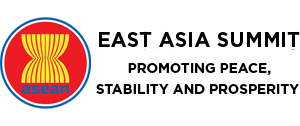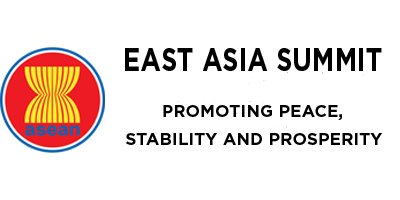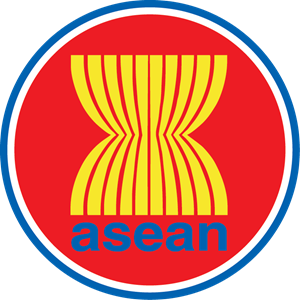ENVIRONMENT & ENERGY
1.1 Work toward further mainstreaming sustainable development, and promoting balanced, inclusive, and sustainable approaches:
1.1. .1 Seek to develop activities linked to the implementation of regionally relevant outcomes, building on existing ASEAN programs, other relevant regional activities of the United Nations (UN) Conference on Sustainable Development (Rio+20);
1.2 Increase the policy dialogue and communication and forge greater collaboration through mechanisms, including the EAS Environment Ministers’ Meeting and EAS Energy Ministers' Meeting;
1.3 Recognize the Cebu Declaration on East Asian Energy Security and the Singapore Declaration on Climate Change, Energy and the Environment;
1.4 Support the implementation of the activities, action plans, and research studies on energy cooperation being carried out under the ASEAN framework and between ASEAN and Dialogue Partners, including:
1.4.1 ASEAN Plan of Action for Energy Cooperation (APAEC) 2016-2025 Phase 1: 2016-2020;
1.4.2 EAS Energy Cooperation Task Force (EAS ECTF) work plan;
1.4.3 East Asia Low Carbon-Growth Partnership Initiatives;
1.4.4 Research Studies consistent with the EAS Mid-Term Energy Policy Research Roadmap;
1.4.5 Research Studies by the Economic Research Institute for ASEAN and East Asia (ERIA) for EAS Energy Cooperation following to EAS Mid Term Energy Policy Research Roadmap, but not limited to:
(i) Sharing EAS energy supply/demand outlook; EAS energy outlooks for the medium-to-long-term
(ii) Enhancement of security of energy supply;
Study on social benefit brought by high standard emission regulations in ASEAN Enhancing energy supply chain resilience Study on sustainable development of natural gas market in the EAS region Assessing the potential small scale LNG distribution and pipeline
(iii) Climate change mitigation and environment protection;
Promotion of energy efficiency and greenhouse gas emission mit gation in the transport sector Assessment of electricity storage technology for Solar/PV
(iv) Building basic information and knowledge; Capacity building training on preparation of energy statistics for Lao PDR and Myanmar
1.5 Conduct join research and development (R&D) and investment on renewable and alternative energy, which may include, as appropriate:
1.5.1 Encouraging the active role of the Biofuels for Transport and Other Purposes Work Stream and the Renewable and Alternative Power Generation Work Stream;
1.5.2. Continuing to support the EAS Clean Energy Forum;
1.5.3 Encourage interested EAS participating countries to consider supporting, where applicable and on a voluntary basis, the work of the International Solar Alliance, among others;
1.6 Stimulate discourse analyzing the barriers to renewable energy policies and of investment in renewable energy:
1.6.1 Promote dialogue on reform of fuel subsidies which encourage wasteful consumption, while recognizing the importance of providing those in need with essential energy services;
1.6.2 Encourage renewable energy investments and balanced financing in the renewable energy sector;
1.7 Promote the deployment of advanced technologies on energy efficiencyand conservation:
1.7.1 Encourage the active role of Energy Efficiency and Conservation Work Stream and support the research study on smart and eco-friendly cities by ERIA;
1.8 Enhance research and cooperation on sustainable urban development and smart solutions as well as raise the environmental awareness of the general public:
1.8.1 Encourage support for programs on sustainable and smart cities, and continue holding the High-Level Seminar on Environmentally Sustainable Cities (HLS-ESC);
1.9 Bring to a higher level the work on EAS cooperation in climate change adaptation and mitigation:
1.9.1 Continue cooperation through the East Asia Low Carbon Growth Partnership in order to build awareness of climate change mitigation;
1.9.2 Continue to hold the EAS Seminar on Climate Change Adaptation Capacity Building bearing in mind that adaptation and mitigation are both important in addressing the short and long-term effects of climate change in the EAS region;
1.9.3 Encourage cooperation with the Asia-Pacific Adaptation Network (APAN) under the auspices of the Global Adaptation Network (GAN);
1.9.4 Encourage the establishment of the East Asia Center for Climate Change Research and International Cooperation;
1.9.5 Promote dialogue and cooperation in the field of advanced energy technologies, including carbon capture and storage, energy storage, and energy efficiency and clean and renewable energy technologies in electrical power generation and transport;
1.9.6 Continue to promote the usage of renewable energy resources, such as wind, solar, geothermal, hydro, biomass, and ocean energy;
1.10 Encourage support to the ASEAN Centre for Biodiversity (ACB), a regional organization and center of excellence dedicated to the promotion of regional collaboration on biodiversity conservation;
1.11 Continue to promote the conservation, protection and preservation of the marine environment through responsible and sustainable use of marine resources, building on initiatives of various ASEAN-Ied mechanisms;


